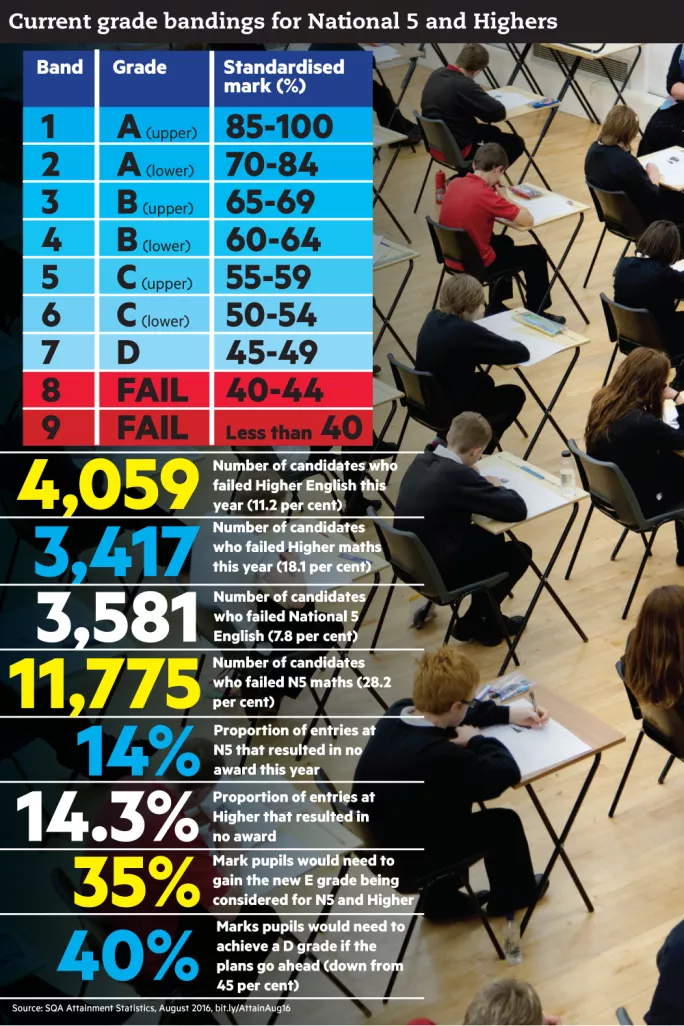Plan for new E grade to cut number of exam fails

Major Changes could be made to the exam grading system that would allow weaker students, who would previously have failed, to walk away with a qualification, TESS can reveal.
The Scottish government’s assessment and national qualifications working group - which is chaired by education secretary John Swinney - is considering lowering the mark needed for a D grade, as well as introducing an E grade, at National 5 and Higher.
The E grade would allow pupils gaining a mark of as little as 35 per cent in the final exam to walk away with a qualification instead of a fail. Meanwhile, pupils could be able to gain a D with a mark of just 40 per cent, as opposed to the 45 per cent boundary in place currently.
The change would aim to tackle what secondary headteachers are describing as an “unintended consequence” of the government’s scrapping of unit assessments - a move that was meant to ease teacher workload and pressure on pupils.
Considering ‘cusp pupils’
Stephen Miller, president of headteachers’ body School Leaders Scotland (SLS), said that “cusp pupils” who failed their exams were in danger of having nothing to show for their work owing to Mr Swinney’s decision to axe the controversial assessments earlier this year.
Under the system of unit assessment, pupils who have failed the overall qualification are still issued with a certificate featuring a list of any units they have passed.
Ultimately, senior pupils would now have less chance to achieve paper qualifications, something that ran counter to the government’s desire to close the attainment gap, said Mr Miller, who sits on the assessment and national qualifications working group.

EIS teaching union president Larry Flanagan, who also sits on the group, said that it was considering “extending the D grade to ensure that pupils don’t end up narrowly missing out”, as well as introducing an E grade.
He said: “The working group is looking at making sure there’s enough margin of error, so you don’t end up with people not getting a qualification.”
Professor Louise Hayward, another group member and an expert in assessment at the University of Glasgow, told TESS that it was important the unit assessments were scrapped to ease workload pressure on teachers. However, she argued that extending the D grade and introducing an E grade should be a temporary measure only.
She called for a thorough investigation to uncover what had led to the unit assessments piling pressure on staff and pupils.
“We need to better understand the problems that led to the workload issue,” Professor Hayward said.
A Scottish government spokesperson said that the cumulative impact of the unit assessments had contributed to “an over-assessment burden for both young people and teachers”, and their removal would “significantly reduce this burden”. The units would, however, remain available as standalone qualifications, as an alternative to full courses.
The spokesperson added: “This will allow schools to make decisions, based on teachers’ professional judgement about the appropriate qualifications for which each young person should be presented.
“The decision to remove unit assessments from the National qualifications was taken following consultation with the assessment and national qualifications group and was endorsed by the Curriculum for Excellence management board.”
A spokesperson for the Scottish Qualifications Authority confirmed that “the possible extension of the grade scale is currently being discussed” at the assessment and qualifications working group.

You need a Tes subscription to read this article
Subscribe now to read this article and get other subscriber-only content:
- Unlimited access to all Tes magazine content
- Exclusive subscriber-only stories
- Award-winning email newsletters
Already a subscriber? Log in
You need a subscription to read this article
Subscribe now to read this article and get other subscriber-only content, including:
- Unlimited access to all Tes magazine content
- Exclusive subscriber-only stories
- Award-winning email newsletters